Bukowski: The Last Straw is a film of genre Documentary released in USA on 30 march 1980
Bukowski: The Last Straw (1980)
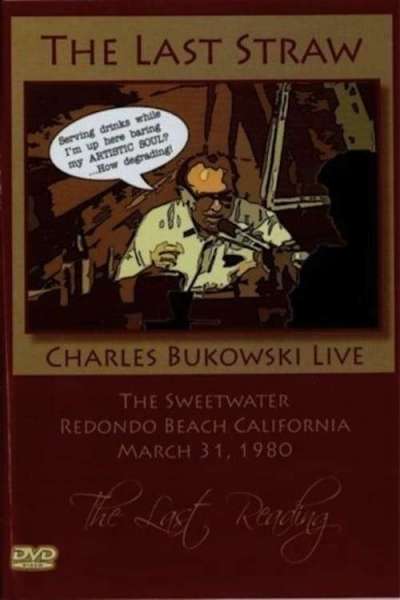
If you like this film, let us know!
- Infos
- Casting
- Technical infos
- Photos
- Videos
- Film quotes
- Characters
- Music
- Awards
The Last Straw is a film documenting the very last live poetry reading given by Charles Bukowski, even though he lived and wrote for another 14 years. The reading was given at The Sweetwater, a music club in Redondo Beach, California on March 31, 1980. It is produced and directed by Jon Monday for mondayMEDIA.
Comments
Leave comment :
Suggestions of similar film to Bukowski: The Last Straw
There are 8951 with the same cinematographic genres, 852 films with the same themes, to have finally 70 suggestions of similar films.If you liked Bukowski: The Last Straw, you will probably like those similar films :
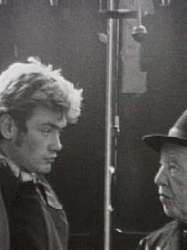
Proust, l'art et la douleur (1970)
Directed by Guy Gilles
Genres Documentary
Themes Films about writers, Documentaire sur une personnalité
Actors Emmanuelle Riva, Patrick Jouané
Rating30%





Film autour de la vie et du travail de l'écrivain Marcel Proust, entrecoupant des scènes jouées et des entretiens de témoins de sa vie.

Origin USA
Genres Documentary
Themes Films about writers
Actors Graham Greene, Derek Jacobi, Bill Nighy, John Mortimer
Rating76%





 , 1h35
, 1h35Origin USA
Genres Documentary
Themes Films about writers, Documentary films about business, Documentary films about the film industry
Actors Orson Welles, Peter Bogdanovich, Julie Taymor, Steven Spielberg, Martin Scorsese, Elvis Mitchell
Rating68%





 , 1h
, 1hDirected by Raphaël Millet
Origin France
Genres Documentary
Themes Films about writers, Films about journalists, Documentary films about business, Documentary films about the visual arts, Documentary films about the film industry, Documentaire sur une personnalité, Political films
Actors Pierre Schoendoerffer, Costa-Gavras, Raoul Coutard, Jacques Perrin
Pierre Schoendoerffer revisits his life and career, with a strong focus on the impact that his experience as a war cinematographer for the French army during the Indochina War had on him, as well as a war reporter during the Vietnam War when he filmed his 1967 Academy Award winning documentary The Anderson Platoon named after the leader of the platoon - Lieutenant Joseph B. Anderson - with which Schoendoerffer and his crew were embedded.
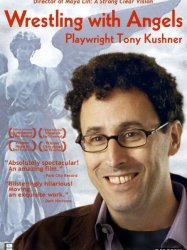 , 1h38
, 1h38Genres Documentary
Themes Films about writers, Documentaire sur une personnalité
Actors Bill Camp, Mary-Louise Parker, Harrison Chad, Jeffrey Wright, Linda Emond, Marcia Gay Harden
Rating60%





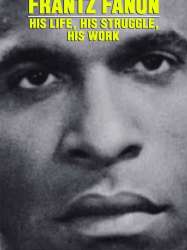 , 52minutes
, 52minutesOrigin Algerie
Genres Documentary
Themes Films set in Africa, Films about writers, Documentary films about law, Documentary films about historical events, Documentaire sur une personnalité, Documentary films about politics, Political films
This movie depicts Frantz Fanon's life. A psychiatrist from Martinique, he became a spokesman for the anti-colonialist struggle. In 1952, Frantz Fanon wrote Black Skin, White Masks, an analysis of racism and the ways in which its victims internalize it. In the 50s, he aided the rebels of the Algerian anti-colonial war. Expelled from Algeria in 1956, he moved to Tunis, Tunisia, where he wrote for the rebel newspaper El Moudjahid, founded one of Africa's first psychiatric clinics and wrote several books on decolonization. He died from leukemia in Washington, D.C., at the age of 36.

The Broken Tower (2012)
, 1h39Directed by James Franco
Origin USA
Genres Drama, Biography, Documentary, Historical
Themes Films about writers, Films about sexuality, LGBT-related films, LGBT-related film
Actors James Franco, Michael Shannon, Dave Franco
Rating48%





The film begins with a plot structure based on a progression of chapters titled as "Voyages" in Hart Crane's life loosely related to Crane's lyric poem of the same name. In the first "Voyages", a depiction is made of an early attempt by Crane to take his own life. Among the other opening "Voyages", the audience is also shown depictions of several same sex relationships which Crane had throughout his lifetime in semi-graphic portrayal consistent with the film's rating. Crane's life is shown progressing through the various "Voyages" in the film, largely portrayed through his troubled relationship with the father, his close relationship to his mother, and his frustrating relationship to his job in advertising as a copyrighter in New York City. In the final "Voyages", Crane's difficult relationship to alcoholism is depicted, ending with his final "Voyage" on a small cruise ship at sea in the vicinity of Mexico where Crane ended his life by his own hand.

Life Itself (2014)
, 2h1Origin USA
Genres Biography, Documentary
Themes Films about writers, Films about journalists, Documentary films about business, Documentary films about the film industry, Documentaire sur une personnalité, Documentary films about cities
Actors Roger Ebert, Stephen Stanton, Werner Herzog, Martin Scorsese, Errol Morris, Ramin Bahrani
Rating77%





Un documentaire inspiré des mémoires éponymes du critique de cinéma américain et chroniqueur social mondialement connu : Roger Ebert. Lauréat du Prix Pulitzer pour ses critiques publiées dans le Chicago Sun-Times, Roger Ebert est devenu l’une des personnalités les plus influentes du monde de la culture aux États-Unis.
 , 1h19
, 1h19Directed by Ritu Sarin, Tenzing Sonam
Origin Inde
Genres Documentary
Themes Films about writers, Films about religion, Films about Tibet, Documentary films about politics, Documentary films about religion, Political films, Films about Buddhism
Rating65%





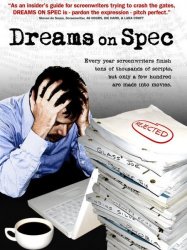
Dreams on Spec (2007)
, 1h26Origin USA
Genres Documentary
Themes Films about writers, Documentary films about business, Documentary films about the film industry, Documentary films about cities
Actors James L. Brooks, Nora Ephron, Carrie Fisher, Gary Ross, Steven E. de Souza, Scott Alexander
Rating62%





The film follows three aspiring screenwriters as they struggle to turn their scripts into movies. David is a hip talent agent's assistant with three scripts circulating around town. He's plugged into "young Hollywood" - and when he's not working or writing, he's usually hanging out at the beach. Joe is a middle-aged family man who has split time over the last three years between caring for his autistic daughter and writing what he believes could be the great American screenplay. And Deborah is trying to become one of the few African-American women to ever write and direct a feature film, though she's struggling just to pay her bills while she searches for money to produce her script. Between these stories, the film intercuts critical insight from such Hollywood screenwriters as James L. Brooks, Nora Ephron, Carrie Fisher, Gary Ross, Steven E. de Souza, Ed Solomon, Paul Guay, Scott Alexander and Larry Karaszewski.
 Connection
Connection